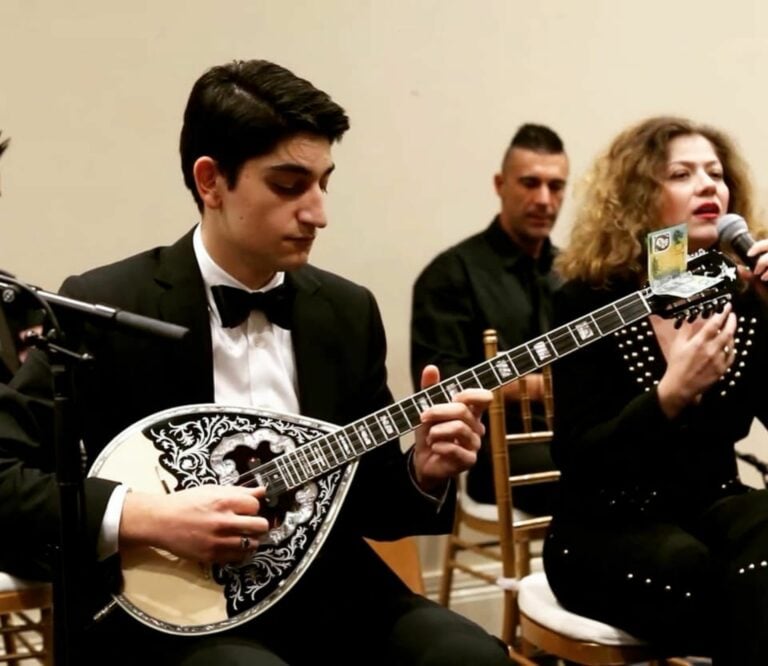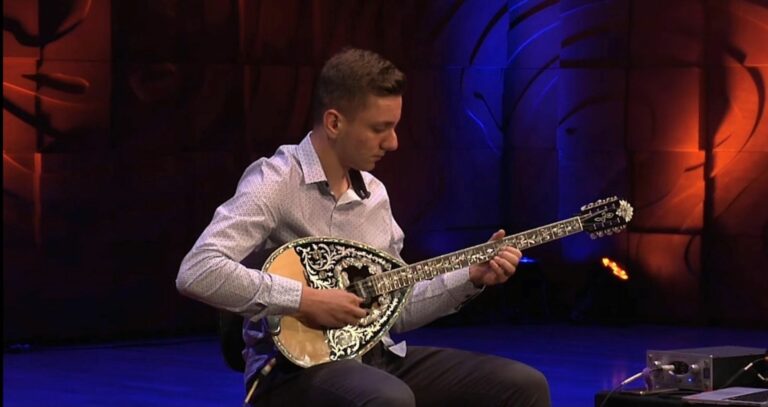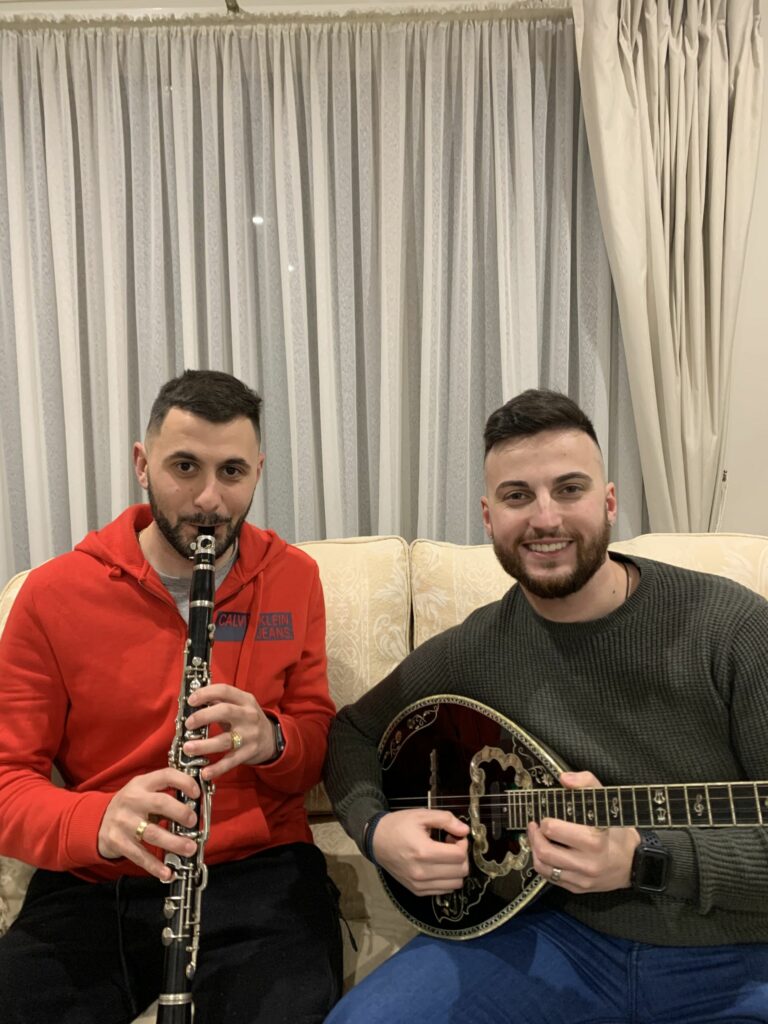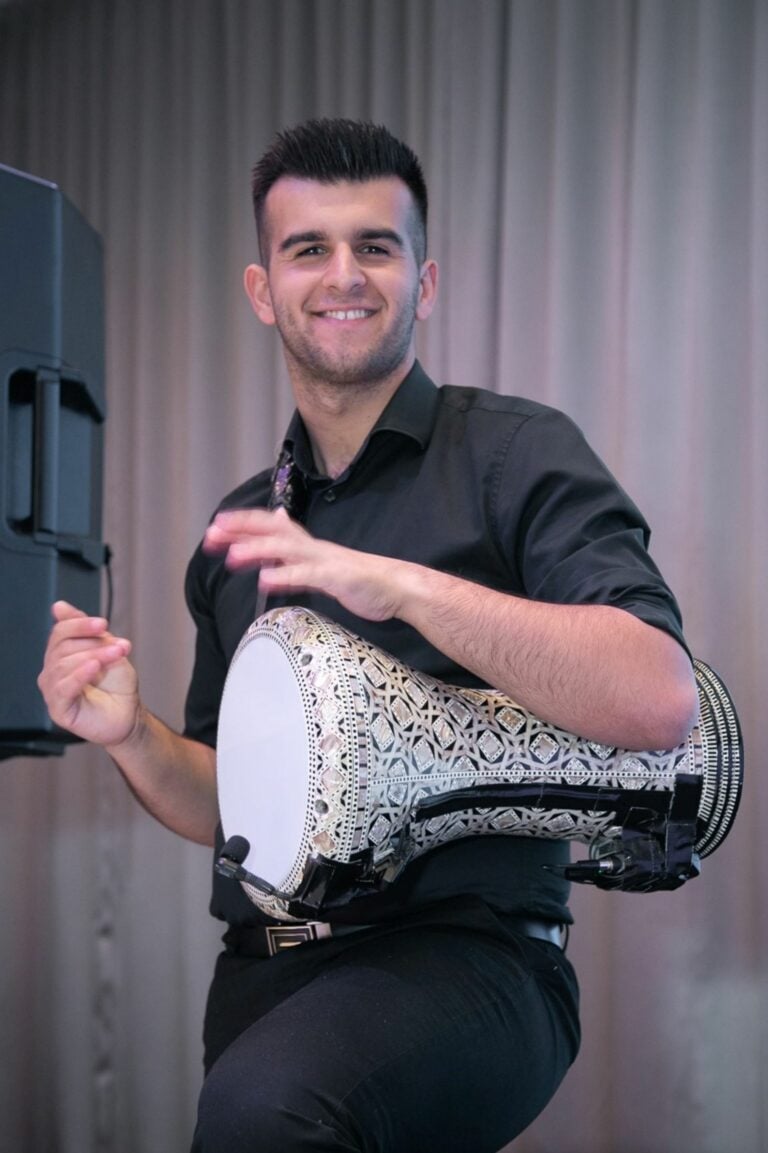Greek music has evolved over centuries, melding sounds from across the Middle East and Asia Minor to create melodies and tunes that are distinct and instantly recognisable to Greece.
From the slow plucks of the zeimbekika, to the upbeat kalamatiana and chimes of the nisiotika, there is something for everyone to enjoy.
As new generations of Greek-Australians are brought into the world, the fear of losing this integral part of Greek culture grows.
Early Greek-Australians have nothing to worry about as there are many young musicians who are making sure that the music of their forefathers and mothers are heard loud and clear on the shores of the ‘lucky country’.
READ MORE: Byzantine ecclesiastical music, where tradition is a way of life
Harrison Giavris, 21
@harrisongiavris_bouzouki

Greek music was as common in Harrison Giavris’ house as the kitchen sink. Growing up with his grandparents around meant that the likes of Dionisiou and Angelopoulos were always within earshot.
“Greek was my first language when I was growing up because I grew up with my grandparents. So Greek music was always part of the fabric of our home and I just started playing. I don’t know what possessed me one day, but I started playing Greek songs. I tuned my guitar down to a bouzouki tuning, and started playing,” he said.
Picking at the bouzouki is not only a way for Mr Giavris to engage with his heritage, but it also helps him connect with his pappou.
“My grandfather had been telling me to play Greek music since I picked up a guitar, which was when I was in year four. I never I never listened to him then and he passed away when I was in year nine. I started playing [the bouzouki] when I was in year 11, so it makes me feel closer to him,” he explained.
“I definitely have a bit of a regret that he never heard me play.”
Mr Giavris’ favourite pieces to play are those of which he grew up listening, as he feels the more modern pieces have lost a little bit of their touch.
“I don’t mind listening to modern Greek music, but I feel that modern Greek music has been diluted in a sense. When you study laiki mousiki, you learn all of the scales and all the theory that we employ and a lot of it is from the Middle East and Asia Minor and made its way across Greece through waves of migration but now everything sort of been diluted in a way that it all sort of sounds the same. It’s become very Americanized.”
Notis Karidakis, 18
@notis_k_bouzouki

Notis Karidakis is one of many young people finishing high school in and out of lockdown. His bouzouki keeps him company and helps him escape from the stresses of year 12.
“Sometimes I get too drawn into my playing. I could sit down and then look at my phone and I realise I’ve been playing for three hours…I’m in the zone. My mum keeps telling me ‘I’ve been calling you for the past 20 minutes where have you been?’,” he said.
“It allows me to just to block every distraction.”
Mr Karidakis is the only person in his family that plays a musical instrument, and when the bouzouki first piqued his interest, his parents were skeptical.
“I started listening to the bouzouki players from Greece. I told my parents that I wanted to start learning. I wanted to buy my first bouzouki and they were a bit hesitant. They didn’t know whether I’d pursue it or whether it be just a waste of time,” he said.
The 18-year-old has come a long way since picking up his first bouzouki at Brunswick’s Volaris Music, having joined the Greek Legends of the 20th Century tour and appeared before a very famous Greek singer.
“I’ve played in a virtual concert with [Giorgos] Mazonakis who was in Greece. I would like to make that happen in person on day.”
Anthony Kotatzis and Billy Andrikopoulos, 28
@ta_palikaria

Getting into Greek music was a family affair for this dynamic duo.
Anthony Kotatzis’ father had his own band back in the day and Billy Andrikopoulos’ uncle who sings dimotika around Australia introduced him to the ropes of Greek music and the magic of the heritage connected to it.
“I can only talk for a clarinet really, but that instrument is hundreds of years old it has deep roots within people from various parts of Greece, you know it’s a heritage thing. It’s embedded in it, you don’t find that with music instruments often. You see that instrument and that instrument is culture. Even the bouzouki. There is only one country in the world has a bouzouki and that’s Greece,” Mr Andrikopoulos said.
As fate would have it, the two musicians eventually found one another and decided to join forces, sharing their love and passion for the Greek music they grew up listening to.
“What I personally like most is how well the instruments mix together. You have the most traditional types of Greek instruments together and mixing them, knowing that it provides good entertainment is my favourite part of playing together. I love that you can get the crowd up and you can lift the vibe,” Mr Kotatzis said.
Antonis Pistikakis, 15
@antonis_bouzouki

Antonis Pistikakis was inspired to pick up the bouzouki upon his return from a family trip to Greece.
“As I travelled in Greece I, I began to develop a strong passion for Greek music. I’ve always loved playing and listening to music from a young age. I started off playing the electric guitar when I was only eight years old, playing classic blues and rock songs. However, after I got to experience Greek culture and music, I started to learn Greek songs on the guitar,” he said.
It was then that the bouzouki his dad had been given around two decades ago as a birthday gift had found a new tune.
While transferring over his guitar playing abilities definitely helped him on his bouzouki learning journey, delving into Greek music also brought about some other skills for the young musician.
“The funny thing is, one of the biggest things that helped me learn it was actually listening to Greek music and then searching up those lyrics and the meaning behind the songs. And that’s how I’d actually find new vocabulary…I’ve never gone to Greek school,” Mr Pistikakis said.
For now, the 15-year-old looks forward to getting back to performing for the public as soon as lockdown measures ease.
“I just I really like making people happy. I love seeing them dance when I perform and I also love carrying the Greek to tradition through to more generations in the modern world.”
Nicholas Sofos, 22
@nicholas_sofos

Nicholas Sofos has been drumming out beats on a kit since year seven, playing mostly jazz, pop and rock pieces. His musical senses were yearning for something more, something closer to home.
It wasn’t until his Greek dance teacher that introduced him to the daouli. That’s when Nicholas delved into playing Greek music.
“Deon [Manasis] introduced me to a little bit of percussion and then that’s when the toumbeleki caught my eye. I really loved the shape of it, I loved the colour, the design. I thought it was a beautiful instrument. I knew I had to learn it otherwise if I don’t learn, I’m going to be sitting here playing the same jazz pieces on drums for a while,” he said.
It was through the toumbeleki that Mr Sofos really came to appreciate the deep roots of Greek music and the mixing of cultures that inspired the songs.
“A lot of Greek musicians do travel to Turkey to learn the rhythms and the basic beats and different variations of music, which is then translated into Greek music, because the toumbeleki is actually a Turkish instrument,” he said.
“It’s traditionally known as a darbuka which is a traditional drum from Turkey. So, a lot of their beats that we use in the tsiftetelia, kalamatiania and other rhythms, all work in the same way as a Greek beat. A Turkish beat is more of a slower, more of a warmer kind of broken-down beat, but when you’re translating it to Greek, you’re playing it double time.”
Mr Sofos is usually busting out these methods of music with the Kinisi band, but he also had the opportunity to play with beloved Greek singer, Dimitris Basis.









